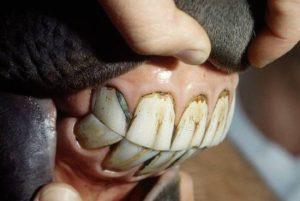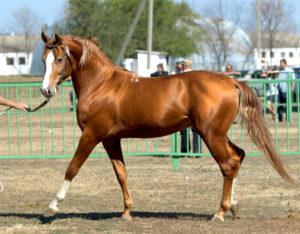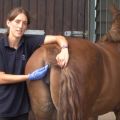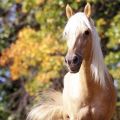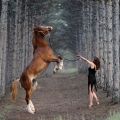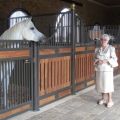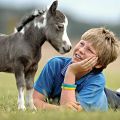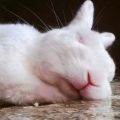How and how much horses sleep and how to create optimal conditions for their rest
As you know, the horse is one of the first animals tamed by man. Carriages and carts have long since sunk into oblivion, and fast horses still enjoy the love and admiration of people. Many have seen what horses look like, but not everyone knows how these amazing creatures sleep. The maintenance and education of a horse is not an easy matter. In order to be successful in the field of riding, you need to study the habits and habits of these graceful animals.
How horses sleep - consider the question from a scientific point of view
To a person far from the intricacies of horse breeding, it may seem that horses always rest while standing. It is hard to believe that such a massive animal can lie down on the ground and then effortlessly stand on its feet.
Zoologists claim that a horse's sleep can be divided into 2 important phases:
- fast (half-asleep and nap);
- deep (deep sleep).
Depending on the phase of sleep, the horse can sleep in a standing position or lying on its side.
On foot
At city festivities, you can often find a horse peacefully frozen in anticipation of a client. As a rule, the animal stands with its head down. The horse's back is arched at the lower back, the muscles are relaxed, and the hind leg is slightly bent.
In this position, the horse is half asleep. Such a dream is unsteady, the animal perfectly hears the surrounding sounds and controls the situation.
In a state of half-sleep, the horse spends the lion's share of the time. Thanks to the unique structure of the knee joints, the horse can rest while standing. The horse's impressive weight is evenly distributed over all 4 limbs. Deep sleep in this position is impossible. The state of half-sleep can last no more than half an hour.

On the side
In deep sleep, the horse lies on its side. The horse's neck and legs are extended, the tail and ears remain motionless. In a dream, a horse can make sounds, jerk its legs or head. At this time, the animal is completely defenseless. We can say that the horse is unconscious. It will take him a few minutes to recover.
In the wild, fast sleeping horses are guarded by congeners. When signs of danger appear, the watchmen give a signal to flee. Under natural conditions, an adult horse rarely falls into deep sleep. There are too many dangers around.
In some cases, animals can go for several months without sound sleep. For example, a horse taking the place of a leader in a herd cannot leave his post even for a short time. In an attempt to take the place of the leader, a young stallion strives to take advantage of his weakness.Foals feel the most at ease. Under the supervision of the mother, they sleep as long as they please.
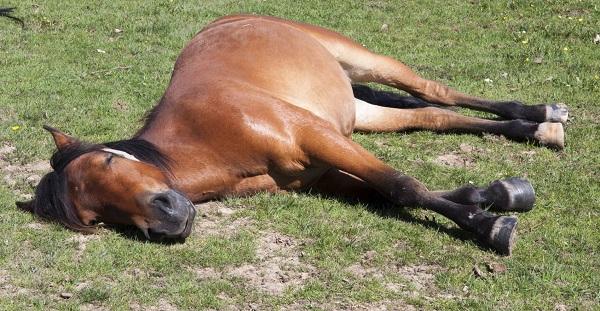
Are your eyes open or closed?
With closed eyes, the horse sleeps only in a state of deep sleep. In other cases, the animal's eyes are half-open.
Drowsiness - the main differences from sleep
In a state of dormancy, the horse rests in the prone position. Her limbs are tucked under her own torso, her muscles are relaxed, and her head is lowered to the ground. Superficial sleep helps the horse to replenish lost strength. At the same time, the animal is in a state of "combat readiness" and at the slightest danger is ready to jump off the spot. The animal's ears are constantly flinching. As highly sensitive antennas, they pick up any sound. Hearing the alarm, the horse with a quick movement straightens its front legs and jumps up.
Do horses dream?
During sound sleep under the closed eyelids of the animal, uncontrolled eye movements are clearly visible. This is a sign that your pet is dreaming. Watching a sleeping horse, you can see how the lips and limbs of the horse tremble.

How much should a horse sleep
In its natural habitat, the horse is busy with games, food and other important activities, so he sleeps from 6 to 8 hours a day. The state of complete immersion in sleep lasts no more than 3-4 hours. During the time allotted for rest, the animal manages to replenish its strength, periodically falling into a state of drowsiness or deep sleep.
In stable conditions, the pet stays at rest for much more time. Here the animal feels completely safe. The horse does not need to travel in search of food and keep alert in anticipation of predators. Being in a state of idleness, the animal sleeps from 6 to 15 hours a day.
Factors affecting the duration and quality of sleep
In the wild, horses rarely enjoy deep sleep. The animal is forced to sensitively listen to suspicious sounds and smells. Deep and prolonged sleep is possible only in complete safety, in the circle of one's fellows.
When it comes to stables, the main causes of poor sleep in animals should be noted.
- A cramped room.
- Lack of fresh air.
- Loneliness.
- Hygiene violations.
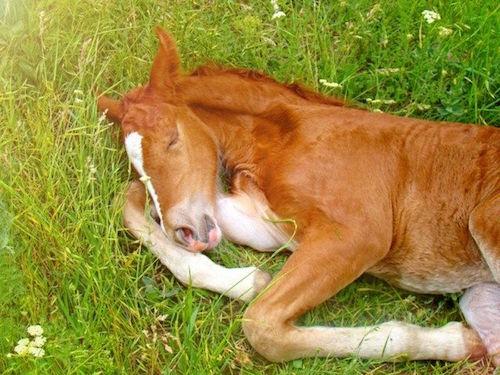
We create optimal conditions for a good rest of the pet
The quality of rest of the inhabitants of the stable depends on the conditions created for the animals by a responsible person.
Safety
The first step is to ensure that the floors in the stable are kept in order. Rotten boards can injure your animal. Fractures, sprains of the tendons lead to serious health consequences for a frisky pet.
High-quality ventilation of the stable and regular cleaning of the stalls will help preserve the health and life of the horse.
Often, due to poor sanitization, the room is simply poisoned by the smell of ammonia. The stench is especially acute below, at the level of 40-50 cm from the floor. For this reason, horses ignore deep sleep, they simply cannot lie in such an environment. Breeders know what kind of trouble a “blockage” of a horse can bring. In this case, the animal is capable of being fixed in a supine position for a long time. Under the weight of its own weight, the horse will have lung problems. In order to prevent blockages, the stall is equipped with special slopes.
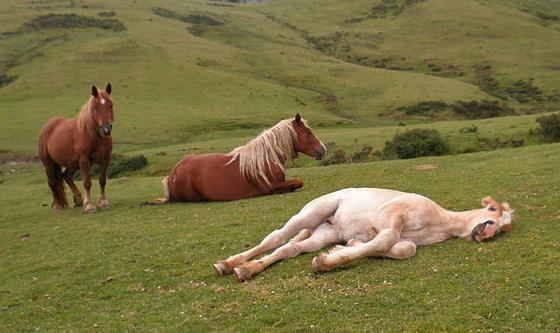
Music
A quiet, melodic composition has a pacifying effect on pets and helps to establish contact between people and animals. Most horses prefer classical music. Some of the compositions are used to train the lynx in animals. Unfortunately, unscrupulous stable owners turn on loud music to please customers.The hearing aid of four-legged pets is much better developed than a human. Loud sounds negatively affect the state of the psyche of animals. Horses become nervous, irritable and uncontrollable. In addition, extra decibels can cause colic in a horse.
Company and comfort
Once alone, even a healthy horse can refuse deep, prolonged sleep. The animal is stressed and does not feel safe. The horse needs constant communication with fellows. Even while walking individually, the horse must see its own kind. Compliance with the walking regimen and constant contact with relatives will bring the animal back to normal.
In order for the pet to feel comfortable, you need to settle it in a spacious room. The stall area should allow the horse to lie down freely on its side and stretch its legs. The horse spends a lot of time indoors; it cannot live in cramped conditions.
Particular attention is paid to lighting the stables. Graceful animals should not be in the dark. The stables are designed so that one pet has at least 1 sq. m windows. Rooms need to be ventilated regularly.
